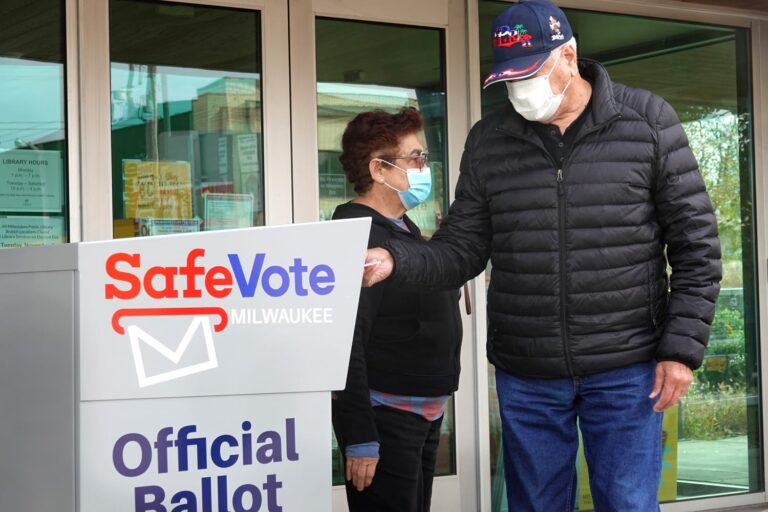The Wisconsin Supreme Court ruled 4-3 Friday to reinstate the use of most ballot drop boxes in the crucial state, reversing a decision it made less than two years ago that banned the use of most such boxes.
“Our decision today does not compel or require municipal clerks to use drop boxes,” Friday’s decision reads. “It simply recognizes … that clerks may lawfully use secure drop boxes in the exercise of their statutory discretion.”
Although the decision was widely expected after the court’s liberal justices signaled their position on the issue during oral arguments in the case in May, it is likely to have broad ramifications for the 2024 presidential election in this crucial battleground, as it effectively authorizes the widespread use of ballot drop boxes.
In 2020, at the height of the Covid-19 pandemic, Democrats widely encouraged their voters to use drop boxes and are expected to do so again this fall.
On the other side, many Republicans have continued to falsely claim that their use is linked to widespread voter fraud. But in anticipation of the ruling, some Republicans in the state are now encouraging their voters to use the ballot boxes this fall.
Friday’s decision marks the latest chapter in an evolving saga in a swing state.
The Wisconsin Elections Commission, which oversees elections in the state, approved funding for expanded use of drop boxes during the COVID-19 pandemic in 2020.
But in a case brought by conservative groups, the state Supreme Court ruled in July 2022 that Wisconsin voters who cast absentee ballots will no longer be able to drop them off at drop boxes located outside of election clerks’ offices. It ruled that only the Republican-controlled state Legislature — not the Wisconsin Elections Commission — has the authority to make laws and policies regarding absentee ballot drop boxes.
However, after liberals won back a majority on the Supreme Court in 2023, the Democratic group Priorities USA filed a lawsuit explicitly seeking to overturn the 2022 decision limiting the use of drop boxes, as well as other rules and restrictions on mail-in voting. (After a Wisconsin lower court narrowed the scope of the lawsuit, the group appealed directly to the state Supreme Court, bypassing lower appeals courts.)
The group had argued that the 2022 decision was wrong because Wisconsin law is silent on the issue of drop boxes. While the group acknowledged that Wisconsin law clearly states that absentee ballots must be returned by mail or in person, it raised the issue in this case that it was unclear whether voters could return absentee ballots in person at locations other than a clerk’s office.
The four liberal justices of the Wisconsin Supreme Court voted to accept the case, agreeing only to consider whether the decision was made incorrectly, but not other issues raised in the lawsuit.
Democrats and progressives in the state have filed numerous briefs urging the court to overturn its 2022 decision, while conservative groups and the Wisconsin Republican Party have filed several briefs in favor of keeping the current drop box rules.
Friday’s decision, however, could accelerate Republican efforts to pass drop boxes in Wisconsin.
In the years since the 2020 election, the use of ballot drop boxes for mail-in votes has been repeatedly criticized by former President Donald Trump and his allies, who falsely claimed that the practice led to widespread voter fraud in 2020.
But in recent months, a shift in attitude toward early and alternative voting methods has emerged within the GOP nationally — including from Trump himself, who has begun to soften his stance.
NBC News reported in May that the Wisconsin Republican Party would begin an effort to encourage its voters to use drop boxes in this year’s presidential election if the state Supreme Court rules to reinstate them — even though they have been highly critical of the voting method in the past — while planning to deploy volunteers to monitor drop boxes in heavily Democratic areas.
Friday’s decision was not entirely unexpected.
The four liberal justices on the Wisconsin Supreme Court repeatedly signaled during oral arguments in May that they believed the court had ruled incorrectly on the issue 22 months earlier, many of them pointing out that state law is silent on the specific issue of drop boxes. The liberal justices on the bench used their time to dismiss false claims by conservatives that the use of the boxes was a source of fraud in previous elections. (There is no evidence to suggest that fraud or abuse occurred in the use of drop boxes in Wisconsin’s 2020 election.)
Meanwhile, state conservatives had criticized the court for taking up the case so soon after it was decided, saying the doctrine of “stare decisis” — the judicial concept that judges must broadly follow legal precedent when formulating and writing opinions — should be invoked.
But the court’s liberal justices explicitly rejected those claims during oral arguments, pointing in particular to the U.S. Supreme Court’s landmark 2022 decision to overturn Roe v. Wade, which had for decades granted a federal right to abortion.
“Roe was seriously wrong from the start. Its reasoning was exceptionally weak, and the decision had harmful consequences,” Wisconsin Supreme Court Justice Jill Karofsky said, reading from the U.S. Supreme Court decision.
“What do we do here, if we think that Teigen made a blatant error from the start, that her reasoning was exceptionally weak, and that the decision had harmful consequences,” she said. The name of the case decided in 2022 by the Wisconsin Supreme Court is Teigen v. Wisconsin Elections Commission.
Karofsky was one of three liberal justices on the 2022 Wisconsin Supreme Court who dissented from the original decision.
Janet Protasiewicz, whose 2023 Wisconsin Supreme Court victory gave liberals their first majority in 15 years, joined the three in Friday’s majority decision.


